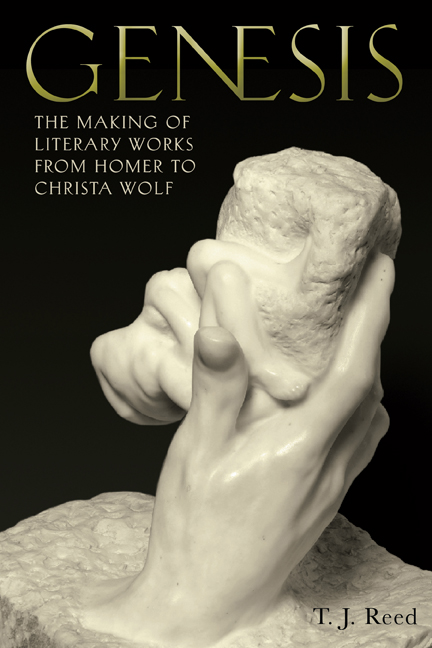Book contents
- Frontmatter
- Dedication
- Contents
- Note on Quotations and Translations
- Preface
- Introduction: Processes
- Part I Antiquity
- 1 Homer's Audiences: Shaping the Iliad (and the Odyssey)
- 2 Fourfold Genesis: The Bible between Literature and Authority
- Part II Early Modern
- 3 An Alphabet of Experience: Montaigne
- 4 Beginner's Luck: Shakespeare's History Cycles
- Transition—Tradition
- Part III Goethe
- 5 Cross-Purposes: Goethe's Faust
- 6 Occasions: Goethe's Lyric Poetry
- 7 Live and Learn: Werther and Wilhelm Meister
- Part IV Nineteenth- and Twentieth-Century German
- 8 Writing on the Run: Georg Büchner's Revolutions
- 9 “The Best-Laid Schemes…”: Thomas Mann Unplanned
- 10 Description of a Struggle: Kafka's Half-Escape
- 11 Atomic Beginnings: Brecht, Galileo, and After
- 12 Knowing and Partly Knowing: Paul Celan's Mission
- 13 Christa Wolf: A Fall from Grace
- Afterword
- Notes
- Bibliography
- Index
1 - Homer's Audiences: Shaping the Iliad (and the Odyssey)
Published online by Cambridge University Press: 16 September 2020
- Frontmatter
- Dedication
- Contents
- Note on Quotations and Translations
- Preface
- Introduction: Processes
- Part I Antiquity
- 1 Homer's Audiences: Shaping the Iliad (and the Odyssey)
- 2 Fourfold Genesis: The Bible between Literature and Authority
- Part II Early Modern
- 3 An Alphabet of Experience: Montaigne
- 4 Beginner's Luck: Shakespeare's History Cycles
- Transition—Tradition
- Part III Goethe
- 5 Cross-Purposes: Goethe's Faust
- 6 Occasions: Goethe's Lyric Poetry
- 7 Live and Learn: Werther and Wilhelm Meister
- Part IV Nineteenth- and Twentieth-Century German
- 8 Writing on the Run: Georg Büchner's Revolutions
- 9 “The Best-Laid Schemes…”: Thomas Mann Unplanned
- 10 Description of a Struggle: Kafka's Half-Escape
- 11 Atomic Beginnings: Brecht, Galileo, and After
- 12 Knowing and Partly Knowing: Paul Celan's Mission
- 13 Christa Wolf: A Fall from Grace
- Afterword
- Notes
- Bibliography
- Index
Summary
Starting
THE STUDY OF LITERARY GENESIS begins in ancient times with the founding cases of scholarship and controversy, Homer and the Bible. This chapter touches on motifs that will recur later. It also suggests a modest alternative answer to some long-standing Homeric questions.
The Iliad and the Odyssey mark the genesis of a genre. Homer is the first great epic author in Western literature, the first whom people identified, or perhaps they simply created him, a legendary and symbolic poetfigure, old, blind, but richer for that in grand and compelling visions. At all events, nothing is reliably known about a real person. Homer—I stick nevertheless to the traditional name—was also the first to suffer the death of the author (a rather different kind from the once alleged death of modern authors) when his role as the sole creator of the Iliad and Odyssey was questioned. Doubts arose from inconsistencies, irregularities, contradictions that stuck out like the proverbial sore thumb. It has never quite healed, but has at best been awkwardly plastered over.
The epics attributed to Homer certainly had a complex and confusing genesis; it has been called “a long process about which we know nothing.” That is too sweeping, since it overlooks a lot that we do know about an enormous cast of people involved in the creation and afterlife of the Iliad and the Odyssey: an unknown number of unknown authors of earlier oral poems; an unknown number of unknown live performers from before and after the epics were given written shape; a large number of scholars and commentators, ancient and modern, known (Aristarchus, Eustathius, and Zenodotus; d’Aubignac, Perrault, and Wolf …) or unknown, who purified, criticized, cut, censored, and bowdlerized the texts. In sum, enough knowns and unknowns to make a fair body of knowledge. Roles are clear, though names and dates are largely lost. Their relation, to the texts and to each other, still leaves wide areas of uncertainty that have nourished controversy for centuries, keeping generations of scholars busy down to our own day trying to see through the complexities to the true substance. So the genesis of Homer's epics is also the genesis of genetic criticism.
- Type
- Chapter
- Information
- GenesisThe Making of Literary Works from Homer to Christa Wolf, pp. 19 - 36Publisher: Boydell & BrewerPrint publication year: 2020



